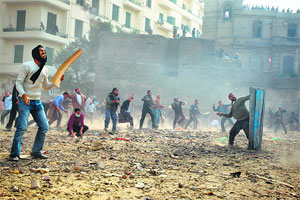Cairo crackdown spreads,govt vows clean-up,no ones buying
V-P says Mubaraks son wont contest polls,PM promises probe.

The Egyptian government broadened its crackdown today to the international media and human rights workers,in an apparent effort to remove witnesses to the battle with anti-government protesters.
Armed supporters of President Hosni Mubarak attacked foreign journalists,punching them and smashing their equipment. Men who protesters said were plainclothes police officers shut down news media outlets that had been operating in buildings overlooking Tahrir Square.
monthly limit of free stories.
with an Express account.
The concerted effort to remove journalists lent a sense of foreboding to events in the square,where battles continued between protesters and Mubarak supporters,who human rights workers and protesters say are being paid and organized by the government. People bringing food,water and medicine to the protesters in the square were being stopped by Mubarak supporters,who confiscated what they had and threw some of it into the Nile.
Under an onslaught of international condemnation for the assault on protesters,the government offered a series of gestures trying to calm the fury.
The prime minister apologised for Wednedays assault and acknowledged it may have been organised. The vice president promised that Mubaraks son Gamal would not run to succeed his father in presidential elections in September and prosecutors announced an assets freeze and travel ban on three former ministers who were among the most unpopular regime figures.
But the gestures appeared likely to be swept away by the turmoil around Tahrir,or Liberation,Square,which for the past 10 days has been the centre of the unprecedented movement demanding Mubaraks ouster.
Protesters accuse the regime of organising a force of paid thugs and police in civilian clothes to attack them Wednesday afternoon,sparking the violence that still rages after nightfall today.
Mubarak supporters,who were largely being beaten back by protesters in the square,launched a series of attacks and harassment against journalists. Lawlessness that had largely eased since the weekend flared anew. A fire raged in a major supermarket outside Sheikh Zayed,a suburb of the capital,and looters were ransacking the building. A residential building neighbouring a five-star hotel on the Nile River corniche was also ablaze,blocks away from Tahrir. Other fires erupted in the Cairo district of Shubra.
At least eight people have been killed and hundreds wounded in the fighting in and around Tahrir.
Prime Minister Ahmed Shafiq acknowledged that the attack seemed to have been organized and said elements had infiltrated what began as a demonstration against the protesters to turn it violent. But he said he didnt know who.
Shafiq,a former air force general appointed by Mubarak over the weekend,said he was willing to go to Tahrir to meet protesters but urged them to disperse. At a press conference aired on state TV,Shafiq defended Mubaraks announcement this week that he would serve out the remaining seven months of his term. Would it be dignified for a nation for its president to leave immediately? There are ethics that must be observed.
The anti-Mubarak movement has vowed to intensify protests to force the president out by Friday. Today,a sense of victory ran through the protesters,even as they organized their ranks in the streets in case of a renewed assault.
The outlawed Muslim Brotherhood the biggest organized opposition group again rejected a government offer to negotiate once the protesters had left Tahrir Square.
Essam el-Erian,a senior leader of the Islamist organization,told Reuters the movement was calling for the removal of the regime,not the state.
This regimes legitimacy is finished,with its president,with his deputy,its ministers,its party,its Parliament. We said this clearly. We refuse to negotiate with it because it has lost its legitimacy, he said.MAGGIE MICHAEL